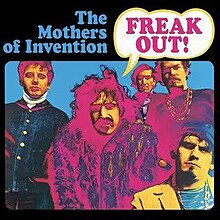| Freak Out! | ||||
|---|---|---|---|---|
 reissue cover | ||||
| Studio album by | ||||
| Released | June 27, 1966 | |||
| Recorded | March 9–12, 1966 | |||
| Studio | TTG, Hollywood | |||
| Genre | ||||
| Length | 60:55 | |||
| Label | Verve | |||
| Producer | Tom Wilson | |||
| Frank Zappa and the Mothers of Invention chronology | ||||
| ||||
| Singles from Freak Out! | ||||
| ||||
| Back cover | ||||
 Featuring a "letter" from Suzy Creamcheese | ||||
Freak Out! is the debut studio album by the American rock band the Mothers of Invention, released on June 27, 1966, by Verve Records. Often cited as one of rock music's first concept albums, it is a satirical expression of guitarist/bandleader Frank Zappa's perception of American pop culture and the nascent freak scene of Los Angeles. It was the second rock music double album ever released, following Bob Dylan's Blonde on Blonde just one week earlier,[2] as well as the first double debut album by a rock artist. In the UK, the album was originally released as an edited single disc.
The album was produced by Tom Wilson, who signed the Mothers, formerly a bar band called the Soul Giants. Zappa said many years later that Wilson signed the band to a record deal under the impression that they were a white blues band. The album features Zappa on vocals and guitar, along with lead vocalist/tambourine player Ray Collins, bass player/vocalist Roy Estrada, drummer/vocalist Jimmy Carl Black and guitar player Elliot Ingber (later of Captain Beefheart's Magic Band, performing there under the pseudonym "Winged Eel Fingerling").[3][4]
The band's original repertoire consisted of rhythm and blues covers, but after Zappa joined the band, he encouraged them to play his own original material, and their name was changed to the Mothers. The musical content of Freak Out! ranges from rhythm and blues, doo-wop,[5] and standard blues-influenced rock to orchestral arrangements and avant-garde sound collages. Although the album was initially poorly received in the United States, it was a success in Europe. It gained a cult following in America, where it continued to sell in substantial quantities until it was discontinued in the early 1970s. The album went back in print in 1985, as part of Zappa's Old Masters Box One box set, with the first CD release of the album following in 1987.
In 1999, the album was honored with the Grammy Hall of Fame Award, and in 2003, Rolling Stone ranked it among the "500 Greatest Albums of All Time". In 2006, The MOFO Project/Object, an audio documentary on the making of the album, was released in honor of its 40th anniversary.
- ^ Lowe, Kelly Fisher (2007). The Words and Music of Frank Zappa. U of Nebraska Press. pp. 38, 219. ISBN 978-0-8032-6005-4.
- ^ "Freak Out! (1966)". Archived from the original on 2015-10-09. Retrieved 2015-11-13.
- ^ "Elliot Ingber info". United Mutations. Retrieved 2007-02-22.
- ^ "FZ Musicians & Collaborators H–L: Elliot Ingber (Winged Eel Fingerling)". Information Is Not Knowledge. Retrieved 2007-02-22.
- ^ Cite error: The named reference
pc14was invoked but never defined (see the help page).